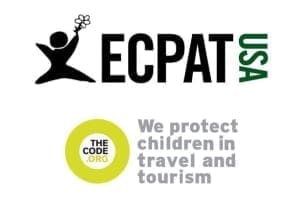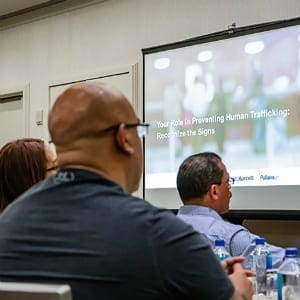 The more we can do as hoteliers to help spot human trafficking and report suspicisons, the better. To that end, we from you this piece from Safety.com.
The more we can do as hoteliers to help spot human trafficking and report suspicisons, the better. To that end, we from you this piece from Safety.com.
The slave trade of the 18th and 19th centuries represents a dark part of history. While officially and legally abolished long ago, the concept of slavery continues to exist today. It is known as human trafficking, and it is highly illegal. This is also known as “modern slavery,” representing the unlawful trade of human beings through recruitment or abduction.
Because human trafficking is a “hidden” crime, finding exact statistics is difficult. However, in 2019 alone, the U.S. National Human Trafficking Hotline was able to identify a total of 22,326 trafficking victims and survivors. They also reported a 19% increase year over year in the number of victims reaching out to the hotline for help, which is promising.
Unfortunately, escape from a trafficking situation is often difficult, and can seem impossible for the victims. However, there are ways in which victims — especially young ones — can break away and escape.
Do human trafficking victims escape often?
There aren’t specific statistics about how many victims escape from their situations, or how often this might occur. The 2020 Trafficking in Persons (TIP) Report noted that globally, in 2019, 118,932 human trafficking victims were identified, and 11,841 traffickers were prosecuted, with 9,548 of those convicted. However, plenty of reasons exist as to why victims feel they need to remain in their situations and cannot escape. They might be undergoing physical or psychological abuse, or the “pimp” or owner could be using threats of violence against the victim’s family. If the human trafficking involves labor, the victim could be in debt bondage to the owner.
Then, there is the emotional attachment factor. Traffickers are masters at manipulating victims to believe they care about them and that they love them.
When it comes to sex trafficking, “pimps hone in on the girls, and offer them the attention and gifts they crave from a man,” said psychiatrist and book author Carole Lieberman. When the girls realize that they’re being groomed for sex with others, “it’s too late,” Lieberman said.
A growing dependency on their traffickers, combined with being kept in unfamiliar places, can also mean the victims stay put.
“Victims do not have the option to hand in their notice, or resign,” said Tera Hilliard, CEO of Forgotten Children Inc. “They are physically and mentally trapped in slavery, with very limited options of freedom.”
Teach children proper actions
Many parents live in fear that their offspring will be snapped off the streets by strangers and sold into the slave trade. However, stories about parking-lot or shopping-center abductions hit “all the marks of a good urban legend,” Michigan State Police Lt. Sarah Krebs told MLive in an interview.
In reality, victims — especially young victims — are manipulated into the life by someone they know or someone they might have met via the Internet. Putting numbers to this, 27% of sex trafficking victims are trafficked by family members, and approximately 32% of victims are trafficked via an intimate partner. Victims of labor trafficking scams are lured by job offers, advertisements or fraudulent means.
Furthermore, it’s estimated that 60% of child sex trafficking victims have a history in the child welfare system, Hilliard said. “Human traffickers will prey on individuals who are most vulnerable, which is why foster children have a greater risk of becoming victims than those who aren’t in the system,” she added.
Whether children are foster, biological or adopted, the key to protection is prevention. To help keep your child safe, keep the following human trafficking safety tips in mind:
- Children should know their name, addresses and phone numbers.
- Children should know how to call 911.
- Children must know how to react if threatened: they should yell, fight and run.
- Children should always ask for parental permission before logging onto the internet. They also must check with parents before talking with anyone on the internet, in a chat room or via messaging.
- Children should be told it’s okay to be rude to adults if they think the adults might be threatening in any way.
- Parents must be involved in all facets of their children’s lives, including who they talk to (both online and in real life), their activities and if the children have any concerns.
If an abductor tries to grab a child, the child should know to:
- Scream “stranger, don’t touch me!” or other “stranger” words. They should also make a great deal of noise and be sure others understand that this is not the child’s parent or relatives.
- Bite, scream, kick and poke the abductor in the eyes, grabbing on to anything they can.
- Run away from any threatening situation, and find the closest adult for assistance.
What to do if you are captured
Despite all of the preparation, warnings and resources, you, or someone you love, could become a victim of human trafficking. If you are in this position, experts suggest these tips.
- Find a way to make contact with someone you trust in the outside world, such as a friend or family members. “Tell that person where you are, and the danger you are in,” Lieberman said. “But don’t ask them to come themselves, because they could be in danger, too.” Instead, ask them to call the police.
- If you can’t do this, find a way to communicate with a stranger, letting them know you might be in danger. Lieberman suggests writing down your name and any identifying piece of information with the word “help” on a piece of paper and then hiding it in your shoe. If you are taken into public, such as a restaurant or store, that paper can be slipped to a proprietor, waiter or cashier.
- Don’t buy into the lies of the pimp or trafficker. If you are a victim, “get help as soon as you possibly can, and don’t believe any lies the trafficker or pimp will tell you,” Hilliard said. “Remember that there are people who genuinely care, and are willing to rescue you.”
- If possible, call a hotline that can help get you out of your situation. In the U.S., reach out to the National Human Trafficking Hotline by calling 888-373-7888, visiting their website or texting “BeFree” (233733).
- Once you escape and get settled, get emotional and mental help. The physical toll of being a human trafficking victim is enormous. The psychological toll can be just as bad, if not worse. The U.S. Office of Justice indicated that individuals escaping the bonds of human trafficking can experience severe guilt, post traumatic stress disorder, depression, anxiety, substance abuse and eating disorders.
The bottom line
Human trafficking involves fear, coercion and fraud to enslave its victims. While escape might seem impossible, advice and help are available to help victims break away from pimps, owners and others whose goal is exploitation. Keeping mentally aware during captivity and finding a way to make contact with a trusted individual — or even an interested stranger — in the outside world can help lead to escape from bondage.
About the author
Writen by Amy Sorter of Safety.com.



















